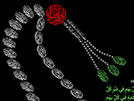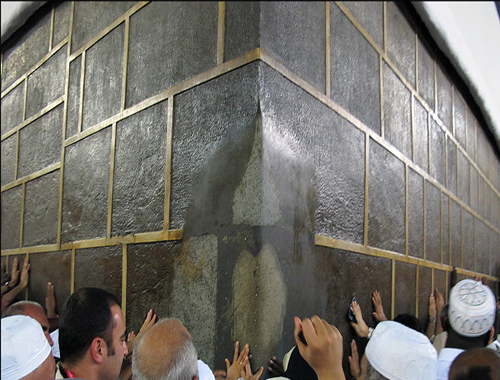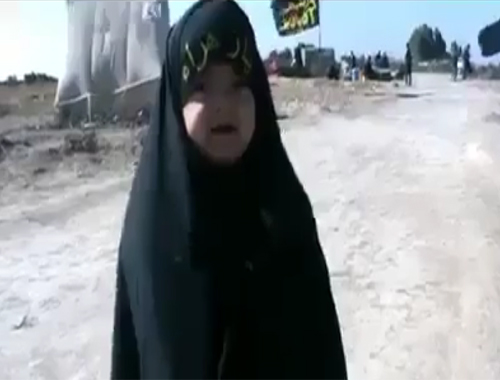Verses 6-13
- Details
- Hits: 2822
Sura A'la
(The Most High)
No.87 (Verses 6-13)
(6) سَنُقْرِؤُكَ فَلَا تَنسَى
(7) إِلَّا مَا شَاءَ اللَّهُ إِنَّهُ يَعْلَمُ الْجَهْرَ وَمَا يَخْفَى
(8) وَنُيَسِّرُكَ لِلْيُسْرَى
(9) فَذَكِّرْ إِن نَّفَعَتِ الذِّكْرَى
(10) سَيَذَّكَّرُ مَن يَخْشَى
(11) وَيَتَجَنَّبُهَا الْأَشْقَى
(12) الَّذِي يَصْلَى النَّارَ الْكُبْرَى
(13) ثُمَّ لَا يَمُوتُ فِيهَا وَلَا يَحْيَى
6. We will make you recite, so you shall not forget
7. Save what Allah wills, surely He knows the manifest and what is hidden.
8. And We will ease you (your way) to a (state of) ease,
9. Therefore do mention for mentioning does profit (mankind).
10. He who fears will heed,
11. But the most reprobate will shun it,
12. Who will enter the Great Fire
13. Then he will neither die therein nor will he live.
Commentary:
We Will Make Everything Prepared For You To Do Good:
The contents of the former verses are about His Lordship and 'Oneness', while in the following verses reference is about the Qur'an and the 'prophere' of the Prophet (p.b.u.h.).
In those former verses (No.1-5) general guidance is given while these verses refer to the guidance of Man in particular. And finally, in the former verses the 'praise of the Lord; the Most High' is indicated, while in the following verses the Qur'an, itself, which conveys that very praise, is specified.
We will make you recite, so you sholl not forget.
Therefore, ( O Mohammad! ), at the time of revelation be patient and do not make haste, you will never forget the Message. He Who descends them to you for the guidance of Mankind, Himself, will protect them and keep them fresh and pure, firmly in your mind, so that they will not be forgotten.
This idea is similar to what is mentioned in Sura Taha, No. 20, verse 114 which says: ...Be not in haste with the Qur'an before its revelation to thee is completed, but say, 'O my Lord! advance me in knowledge' . Also Sura Qiyamat No. 75, verses 16-17 say: Move not thy tongue concerning the (Qur 'an) to make haste therewith. It is for Us to collect it and to promulgate it.
* * * *
Then, referring to Allah's bountiful providence and noting that all gifts are from Him, it goes on to say:
Save what Allah wills, surely He knows the manifest and what is hidden.
The verse does not mean that the holy Prophet (p.b.u.h.) forgets something of the verses, or that his statement would be untrustworthy, it means that the memorization of them is a gift from Allah and, then, whenever He wills He can retrieve it from His prophet. In other words, the idea is to state the difference between Allah's intrinsic knowledge and the Prophet's gifted knowledge.
This verse, in fact, is similar to what is mentioned in Sura Hud, No. 11, verse 108 about the eternity of those who dwell in Paradise, which says: And those who are blessed shall be in Gardens: they will dwell therein for all the time that the heavens and the earth endure, except as thy Lord willeth: a gift without break.
It is certain that the Blessed will never be sent out of Paradise as the last part of the verse attests to, but the expression except as thy Lord willeth' denotes to the Authority and Dominion of Allah's Will and that everything depends on His Will, both for the beginning of creation and its existence.
What confirms this sense is that keeping some data in mind and forgetting others is common for all human beings and cannot be a luxury that Allah counts as a privilege for His prophet. Hence, in this verse the objective is for Prophet (p.b.u.h.) to know, by heart, all the verses of Qur'an and ordiances of Islam.
Some have also said that the objective point of this exception is the verses whose content and recitation both have been abrogated. But this commentary is completely improbable. since, basically, the existence of these kind of verses is not certain.
The sentence '... Surely He knows the manifest and what is hidden' is, in fact, the reason for the following phrase /sanuqri'uka/ 'We will make you recite', remarking that Allah, Who knows all that is manifest and what is hidden, informs the Prophet (p.b.u.h.) about what is necessary for human beings, by means of revelation, and nothing in that connection will be left out.
It is also likely that the Prophet (p.b.u.h.) would not make haste when receiving revelation and would not be afraid of forgetting it, because Allah has promised him that he would not forget anything of the facts and He knows all things which are manifest or hidden.
Furthermore, one of the miracles of the Prophet (p.b.u.h.) was that he learned all the Suras, long and short, by heart, which Gabriel recited only once and he always remembered them forgetting nothing.
* * * *
Then, to console the Prophet (p.b.u.h.), it says:
And We will ease you (your way) to a state of ease.
In other words, the objective is to state the fact that there are many difficulties on the way which he has in front of him: by way of receiving the revelation, preserving it and communicating his prophecy, together with its fulfilment, and also by doing good deeds; in all of which Allah helps him and eases the problems for him.
This statement may refer to the content of the prophetic mission of the Prophet (p.b.h.u.h.) and the divine duties of the believers, viz: its content is easy to follow, his (p.b.u.h.) religion is an easy one for the believers to practise and there are no hard, backbreaking duties contained in it.
Therefore, the above mentioned verse has a vast meaning, though many of the commentators have limited it to only one of its dimensions.
Verily, if it were not for the help and success of Allah, the Prophet (p.b.u.h.) could never win out over those many difficulties.
The life of the Prophet, himself, was also a complete example for teaching this fact.
He was not a taskmaster in any aspect of his life: he ate any suitable food; he wore any clothes that were not repulsive; he slept sometimes in a bed and sometimes on a simple rug, or even on the sand. He was free from any formality; that is, he was friendly and informal.
After referring to revelation and Allah's promise for success and ease for the Prophet's affairs, his greatest duty is mentioned, thus:
Therefore do mention for mentioning does profit (mankind).
Some have said that this means that mentioning is always useful. There are few whom it does not profit. Besides, at the least, it completes the argument and gives reasons to the umbelievers; which in, itself, is of a great benefit.
Some others believe that it means 'do mention whether it be useful or useless'. In fact, it is like what Sura Nahl, No. 16, verse 81 says: ...He made you garments to protect you from heat.... In this verse only 'heat' is mentioned while 'to protect you from the cold' is also understood.
Still other commentators say that the conditional sentence, here, has some meaning and its point is that when mentioning is useful 'do mention' but, when it is not useful it is not necessary to do so.
It is also probable that the term /an/is not used here for conditioning, but for emphasis. If so, the sentence means 'Do mention, for mentioning is useful'.
The first commentary, out of these four commentaries, seems to be the most appropriate.
The practical program of the Prophet (p.b.u.h.) verifies this fact. He put no condition or limit on his citings and used to teach and give the warning to all.
* * * *
Next, attention is paid to the reaction of people, before giving a speech and warning, and they are divided into two groups. Note the following:
He who fears will heed.
But the most reprobate will shun it.
Truly, when the spirit of the fear of Allah or, in other words, when the truth seeking spirit, which is a stage of righteousness, does not exist in Man, he does not derive profit from the admonitions of Allah or the sermons of prophets. For this very reason, at the beginning of Sura Baqarah, No. 2, verse 2 it is said about the Holy Qur'an, that:
In it is guidance sure, to those who fear Allah.
Some narrations denote that Ibn-Abbas has cited that the verse He who fears will heed was revealed about 'Abdullah-ibn-Maktum, the truth-seeking blind man, and some have said that the verse: But the most reprobate will shun it was revealed about Walid-ibn-Muqayyarah and 'Atabata-ibn-Rabi'ah who were among the chiefs of the pagans. (1)
Some have said that the term /asqa/ 'the most reprobate', here, means those who are the enemies of Truth and they dishonour Allah's Message. As people are divided into three groups; in this respect: a) those who are aware and knowledgeable, b) those who hesitate and stand in doubt, c) and those who are the enemies of Truth, it is natural that the first and the second groups derive benefit from admonitions, but, for the third group the admonition is useless. The only thing that can be mentioned about them is that admonition is useful to complete the argument and as a reason for them to be warned.
By the way, it is understood from this verse that the Prophet (p.b.u.h.) proclaimed Allah's Message to the third group, too, but they ran away from it and did not accept it.
It is noteworthy that in these two verses 'the most reprobate' contrasts with 'he who fears Allah' and basically stands opposite to felicity. It is because the main origin of the felicity and salvation of Man is the very fear of Allah and perception of responsibility.
* * * *
In the next verse, the destiny of the last group is proclaimed:
Who will enter the Great Fire
* * * *
Then he will neither die therein nor will he live.
That is, they neither die to be free of the fire nor can the state in which they are in be called 'life'. They are always swinging between life and death; and this is the worse possible state to be in.
For the meaning of the phrase /an-nar-al-kubra/ 'the Great Fire' different attitudes have been formed. Some have said that it means 'the lowest place in Hell', /asfal - us - safilin/ , because they are the most reprobate among people and their penalty also Should be the worse and the most painful one.
Others have said that 'the Great Fire' is the final Penalty or Disaster in the Hereafter, as contrasted with the minor penalties or disasters in this very life. A narration from Imam Sadiq (p.b.u.h.) denotes that he said: Verily your simple fire here is a part out of seventy parts of the fire in Hell. It has been extinguished seventy times with water and has flamed again. If it were not so, mankind could not bear to be close to it. (2)
In the supplication of Kumail, Hazrat Ali (p.b.u.h.), comparing the fire of this world and that of the next world, says: It is a tribillation and ordeal whose stay is short, whose subsitence is but little and whose period is but fleeting.
(1) Qartabi commentary, vol. .10. p.7110.
(2) Behar-al-Anwar, vol. 8, p. 288, Tradition No. 21.











